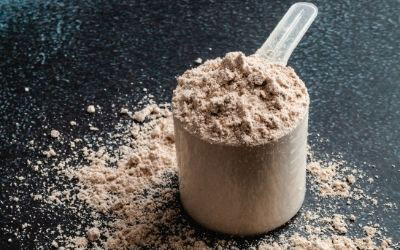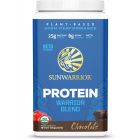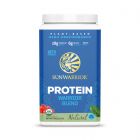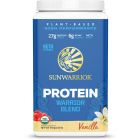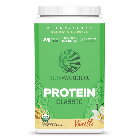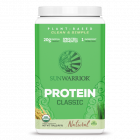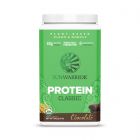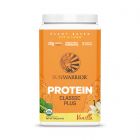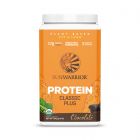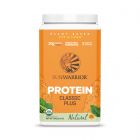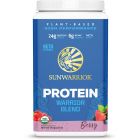9 Most Recommended Vegan Protein Powders
- By Bea Recuerdo (BSc)
- 13 Jul 2022


Nowadays, people shift to a vegetarian or vegan diet for different reasons. It could be a health reason, a personal one – an advocacy, religious belief and a lot more.
Nevertheless, when starting to shift to a diet that the body wasn’t originally designed for, getting sufficient nutrients can be a challenge. One of the first questions that pop into our head is:
"How do I get enough protein and nutrients in a vegetarian or vegan diet?" This is a challenge, especially for athletes and bodybuilders who need to build muscle.
Luckily, today, with the help of science and research, we've gathered data on how to get enough protein and some essential vitamins and minerals on your diet.
The best vegan protein - Top 9

1. Pea Protein
Pea protein powder is rich in BCAAs to support muscle building
Interestingly, pea protein powder is not made from sweet green peas but from their higher protein cousins, yellow split peas.
Serving size
A half-cup (28-gram) serving of raw pea protein powder contains about 22.4 grams of protein and 112 calories, depending on the brand. Like other legumes, it is low in the essential amino acid methionine (Source: NCBI & Eatthismuch)
Health Benefits Pea Protein
However, pea protein is especially rich in essential branched-chain amino acids (BCAAs). Examples of this are leucine, isoleucine, and valine, which help keep working muscles working and stimulate your body to make muscle protein (Source: NCBI).
In a 12-week study, 161 young men ate 25 grams of pea protein powder twice a day, including immediately after strength training. The weakest participants had a 20% increase in biceps muscle thickness than 8% in the placebo group.
Pea Protein Powder Wrap up
- It's an adequate whey protein to support muscle growth compared to consuming whey (milk) (Source: NCBI)
- It may help promote the feeling of fullness
- It may help your lower blood pressure (Sources: NCBI, NCBI II & NCBI III)
Buy Best Vegan Pea Protein:

2. Hemp Protein
Hemp Protein Powder packs some hefty nutrients
Hemp protein comes from the seeds of the cannabis plant. A variety bred to contain only trace amounts of the euphoric compound tetrahydrocannabinol (THC). This means it can't get you high like marijuana (Source: JFNM).
Serving Size
A 28-gram serving of raw hemp protein powder contains approximately 12.6 grams of protein and 108.4 calories, depending on the brand. It's also an excellent source of fiber, iron, zinc, magnesium, and alpha-linolenic acid (ALA), the plant-based form of omega-3 fat (Source: Eatthismuch & NCBI)
Hemp Protein Wrap-up
- Hemp protein powder has more moderate protein levels and is low in amino acids, but there are food items that can fill in the needed amino acids like legumes and quinoa (Source: NCBI)
- It packs many fibers, iron, zinc, magnesium, and ALA omega-3 fat
- It may be a valuable source of blood pressure-lowering compounds but still needs further studies to back up this health claim (Source: NCBI)
Buy Best Vegan Hemp Protein

3. Pumpkin Seed Protein
Pumpkin seed protein contains anti-inflammatory properties and antioxidants
In their whole form, pumpkin seeds are relatively high in protein and healthy fat. When made into powder, most of the fat is removed, reducing calories.
Servings Size
A 28-gram serving of raw pumpkin seed protein powder provides about 150.10 calories and 7 grams of protein, depending on the brand. Because it is low in the essential amino acids' threonine and lysine, it is not a complete protein (Source: NCBI & Eatthismuch).
However, pumpkin seed protein is still very nutritious, providing plenty magnesium, zinc, iron, and other minerals and beneficial plant compounds (Source: NCBI).
Pumpkin seed's protein powder properties
CONS:
- low in the essential amino acids' threonine and lysine
PROS:
- But it is highly nutritious and provides several minerals
- Has been tested in rats to improve liver health compared to casein (milk) protein
- As tested in rats, it may help lower "bad" LDL cholesterol up to 48% because of antioxidant activity compared to casein (milk) protein
Few studies have been done on the health benefits of pumpkin seed protein. Still, some evidence has antioxidant and anti-inflammatory properties (Source: NCBI & IJFP).
Pumpkin Seeds Protein Wrap-up
Pumpkin seeds protein pack a lot of health benefits as compared to casein (milk) protein. But further studies are needed to back up the health claims as there are little to no studies done with human subjects.

4. Brown Rice Protein
Rice protein is rich in BCAAs and as adequate as whey protein
Brown rice protein powder is easy to find and relatively inexpensive.
Serving Size
A serving of neutral rice protein (28 grams) contains about 107 calories and 22 grams of protein, depending on the brand. It is low in the essential amino acid lysine but a good source of BCAAs to support muscle building (Source: NCBI).
Definitely an A+ in muscle growth
In fact, a preliminary study suggests that brown rice protein powder is as good as whey protein in supporting muscle growth when consumed after weight training.
In an 8-week study, young men ate 48 grams or 1.6 grams of rice protein powder. It was consumed immediately after weight training three days a week. Results showed a 12% increase in biceps muscle thickness —the same as for men who consumed the same amount of whey protein powder (Source: NCBI).
Buy brown rice protein with precaution
One problem with rice products is the possibility of contamination with heavy metal arsenic. Choose a brand of rice protein powder that tests for arsenic levels (Source: NCBI).
Brown Rice Protein Wrap-up
- Brown rice protein powder may not have complete protein, but it has been proven that it can still be an adequate whey protein
- However, choose a brand that tests for arsenic levels as there is a possibility of contamination
Buy Best Vegan Brown Rice Protein

5. Soy Protein
Soy protein is a complete protein & can support muscle strength & growth
Soy protein powder is unusual for vegetable proteins. Because, unlike other vegetable-based proteins, it is a complete protein rich in BCAAs to support muscle strength and growth (Source: NCBI).
Serving Size
One serving (28 grams) of soy protein isolate powder has about 95 calories and 25 grams of protein, depending on the brand. Plus, it contains beneficial plant compounds, including some that may lower your cholesterol (Source: NutritionValue, NutritionData, & NCBI).
Debunking a few soy protein myths
Soy protein has fallen out of favor in recent years, in part because most soy is genetically modified (GM) in the US. However, there are a few brands of non-GM soy protein powder (Source: NCBI).
Others reason that soy protein is not so popular because:
- It's an allergen
- It has potential adverse health effects, such as breast cancer risk
But actually...
- In a recent review found that soy protein isolate contains plant compounds that have anti-cancer activity, including against breast cancer. This review also found that some past concerns about soy safety were based on animal results that don't necessarily apply to humans (Source: NCBI).
- It can also help lower cholesterol levels. Because of potential safety concerns, you can buy non-GM soy protein and not use it every day. That said, it's wise to use a variety of plant-based protein powders rather than relying on just one kind.

6. Sunflower Seed Protein
It may support muscle growth and recovery
Protein isolated from sunflower seeds is a relatively new option for vegan protein powder.
Serving Size
A quarter-cup (28-gram) serving of sunflower seed protein powder has about 91 calories, 13 grams of protein, depending on the brand, and provides muscle-building BCAAs (Source: NutritionData).
Being creative with your protein blends
Like other seeds, it is low in the essential amino acid lysine. However, it is a good source of all other essential amino acids. To improve lysine levels, you can try to be creative and combine sunflower seed protein with quinoa protein powder, a complete protein (Source: NCBI & NCBI II ).
To date, no studies are comparing the health effects of sunflower seed protein with other isolated plant protein sources in animals or humans.

7. Sacha Inchi Protein
Sacha Inchi is a good source of all essential amino acids except lysine
This plant-based protein comes from the star-shaped sacha inchi seed (a nut) grown in Peru. Due to a relatively limited supply, it costs more than regular protein (Source: NCBI).
Serving Size
One serving (28 grams) of sacha inchi protein powder has about 120 calories and 17 grams of protein, depending on the brand. It is a good source of all essential amino acids except lysine (Source: NCBI).
The good outweighing the bad
Despite this limitation, when a small group of people was given 30 grams or about 1 ounce of sacha inchi protein powder, it was as effective as the same amount of soy protein powder. This supports protein synthesis in the body (Source: NCBI).
Sacha Inchi Wrap-up
- Sacha inchi protein is an excellent source of the essential amino acid arginine, which your body uses to make nitric oxide. Nitric oxide triggers your arteries to expand, improve blood flow, and lower blood pressure (Source: NCBI)
- This unique vegan protein also provides ALA omega-3 fat, supporting heart health (Source: NCBI)

8. Chia Protein
Chia is a protein & fiber source in one
Chia seeds come from Salvia hispanica, a plant native to South America. They have become a popular dietary supplement, such as smoothies, porridges, and baked goods. Still, they can also be made into chia protein powder.
Serving Size
A 28-gram serving of chia protein powder contains about 50 calories and 10 grams of protein, depending on the brand. It is low in the essential amino acid lysine (Source: NBCI, & NCBI II).
In addition to protein, chia powder contains 8 grams of fiber per serving and high amounts of several vitamins and minerals, including biotin and chromium.
The powdered form of chia can improve digestibility. In a test-tube study, the protein digestibility of the raw seed was only 29%, compared to 80% for chia powder. This means your body can absorb more of its amino acids (Source: MediGraphic).
Chia Protein Seeds Wrap-up
- While you can eat chia seeds whole, the protein may be more digestible when isolated in powder form
- It’s not only a good source of protein but a good source of fiber too which can improve digestion
- It contains high amounts of several vitamins and minerals
Buy Best Chia Protein

9. Creating a blend of plant-based proteins
Many vegan protein powders contain complementary plant proteins
Various powdered vegetable proteins are sometimes combined and sold as blends. These often have added flavors and sweeteners. One of the benefits of blending vegetable proteins is that it can provide optimal levels of all essential amino acids in a single product.
For example, pea protein can be combined with rice protein. The pea protein provides lysine, in which rice protein is low, while rice protein provides methionine, in which pea protein is low.
Tips for your vegan protein blends:
- Quinoa protein is also often used in combination with other vegetable proteins. It is one of the few complete plant proteins (Source: NCBI)
- In trends, you will see mixed vegetable protein powders where enzymes are added to help you digest the product and the use of sprouted or fermented vegetable proteins
- Sprouting and fermentation can increase the amounts of beneficial plant compounds, vitamins, and minerals. It may also help break down plant compounds that can interfere with the absorption of amino acids, minerals, and other nutrients (Source: NCBI, NCBI II, & NCBI III)
Buy Best Vegan Protein Blends
When selecting which plant-based protein, it comes down to
When selecting which plant-based protein is suited for you, you can take note of the following reminders:
- Vegan protein powders can help provide your body with the essential amino acids it needs to support protein synthesis in your body. This includes muscle repair and growth.
- Grains, legumes, and seeds are typical vegetable protein sources in powders, which are made by removing most of the fat and carbohydrates while isolating the protein components.
- Standard vegan protein powders are pea, hemp, brown rice, and soy. Seed protein powders, including pumpkin, sunflower, chia, and sacha inchi, are becoming more and more available.
- In addition to soy and quinoa, plant proteins are usually low in one or more essential amino acids. This is not a problem if you regularly eat various plant foods or buy a powder that contains a mixture of complementary proteins.
- And most importantly, keep in mind that nutritional information varies by brand, so check package labeling.
This article was written by our nutritionist and dietician BSc Bea Recuerdo with the help of a health line professional.






